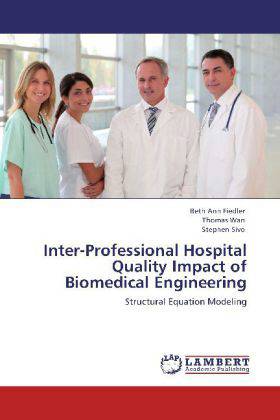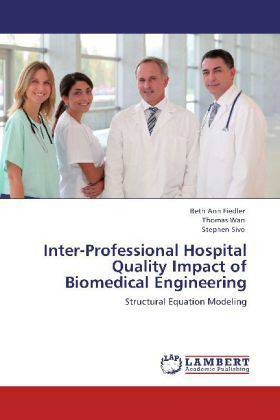
- Afhalen na 1 uur in een winkel met voorraad
- Gratis thuislevering in België vanaf € 30
- Ruim aanbod met 7 miljoen producten
- Afhalen na 1 uur in een winkel met voorraad
- Gratis thuislevering in België vanaf € 30
- Ruim aanbod met 7 miljoen producten
Zoeken
Inter-Professional Hospital Quality Impact of Biomedical Engineering
Structural Equation Modeling
Beth Ann Fiedler, Thomas Wan, Stephen Sivo
Paperback | Engels
€ 77,95
+ 155 punten
Omschrijving
Understanding the relationships between clinical and non-clinical caregivers in the hospital environment of care is vital to determining best practices that improve patient outcomes. The purpose of this study is to understand the relationships among biomedical engineering technicians (BMETs) and clinical caregivers in order to promote hospital quality through the reduction of hospital acquired infections associated with medical equipment. The BMET health support occupation is under-represented in research despite evidence that validates their indirect impact on patient outcomes through their medical equipment duties. Results from the Biomedical Engineering Interdepartmental survey determined the effects of structural complexity and process adequacy in Clinical Engineering using structural equation analysis under the theoretical framework of Donabedian's Structure-Process-Outcome model. Statistical analysis leads to recommendations that hospital environments that create a coordinated organizational culture of interdepartmental device management through communication, collaboration, teamwork, and knowledge management can promote quality and therefore, reduce adverse events.
Specificaties
Betrokkenen
- Auteur(s):
- Uitgeverij:
Inhoud
- Aantal bladzijden:
- 260
- Taal:
- Engels
Eigenschappen
- Productcode (EAN):
- 9783848429110
- Verschijningsdatum:
- 23/03/2012
- Uitvoering:
- Paperback
- Formaat:
- Trade paperback (VS)
- Afmetingen:
- 152 mm x 229 mm
- Gewicht:
- 385 g

Alleen bij Standaard Boekhandel
+ 155 punten op je klantenkaart van Standaard Boekhandel
Beoordelingen
We publiceren alleen reviews die voldoen aan de voorwaarden voor reviews. Bekijk onze voorwaarden voor reviews.











